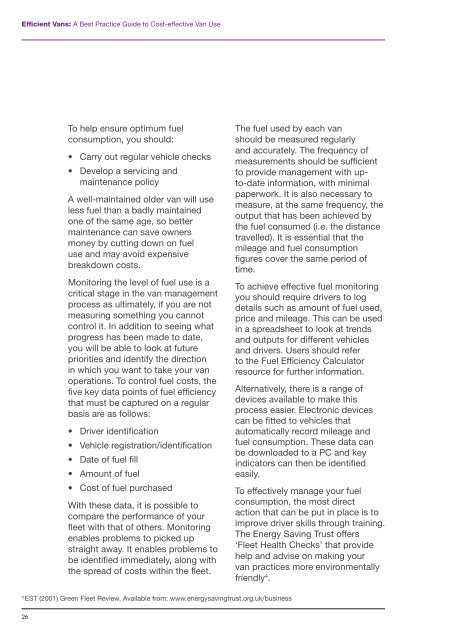Efficient Vans: A Best Practice Guide to Cost - Transport Cafe
Efficient Vans: A Best Practice Guide to Cost - Transport Cafe
Efficient Vans: A Best Practice Guide to Cost - Transport Cafe
You also want an ePaper? Increase the reach of your titles
YUMPU automatically turns print PDFs into web optimized ePapers that Google loves.
<strong>Efficient</strong> <strong>Vans</strong>: A <strong>Best</strong> <strong>Practice</strong> <strong>Guide</strong> <strong>to</strong> <strong>Cost</strong>-effective Van Use<br />
26<br />
To help ensure optimum fuel<br />
consumption, you should:<br />
• Carry out regular vehicle checks<br />
• Develop a servicing and<br />
maintenance policy<br />
A well-maintained older van will use<br />
less fuel than a badly maintained<br />
one of the same age, so better<br />
maintenance can save owners<br />
money by cutting down on fuel<br />
use and may avoid expensive<br />
breakdown costs.<br />
Moni<strong>to</strong>ring the level of fuel use is a<br />
critical stage in the van management<br />
process as ultimately, if you are not<br />
measuring something you cannot<br />
control it. In addition <strong>to</strong> seeing what<br />
progress has been made <strong>to</strong> date,<br />
you will be able <strong>to</strong> look at future<br />
priorities and identify the direction<br />
in which you want <strong>to</strong> take your van<br />
operations. To control fuel costs, the<br />
five key data points of fuel efficiency<br />
that must be captured on a regular<br />
basis are as follows:<br />
• Driver identification<br />
• Vehicle registration/identification<br />
• Date of fuel fill<br />
• Amount of fuel<br />
• <strong>Cost</strong> of fuel purchased<br />
With these data, it is possible <strong>to</strong><br />
compare the performance of your<br />
fleet with that of others. Moni<strong>to</strong>ring<br />
enables problems <strong>to</strong> picked up<br />
straight away. It enables problems <strong>to</strong><br />
be identified immediately, along with<br />
the spread of costs within the fleet.<br />
4 EST (2001) Green Fleet Review. Available from: www.energysavingtrust.org.uk/business<br />
The fuel used by each van<br />
should be measured regularly<br />
and accurately. The frequency of<br />
measurements should be sufficient<br />
<strong>to</strong> provide management with up<strong>to</strong>-date<br />
information, with minimal<br />
paperwork. It is also necessary <strong>to</strong><br />
measure, at the same frequency, the<br />
output that has been achieved by<br />
the fuel consumed (i.e. the distance<br />
travelled). It is essential that the<br />
mileage and fuel consumption<br />
figures cover the same period of<br />
time.<br />
To achieve effective fuel moni<strong>to</strong>ring<br />
you should require drivers <strong>to</strong> log<br />
details such as amount of fuel used,<br />
price and mileage. This can be used<br />
in a spreadsheet <strong>to</strong> look at trends<br />
and outputs for different vehicles<br />
and drivers. Users should refer<br />
<strong>to</strong> the Fuel Efficiency Calcula<strong>to</strong>r<br />
resource for further information.<br />
Alternatively, there is a range of<br />
devices available <strong>to</strong> make this<br />
process easier. Electronic devices<br />
can be fitted <strong>to</strong> vehicles that<br />
au<strong>to</strong>matically record mileage and<br />
fuel consumption. These data can<br />
be downloaded <strong>to</strong> a PC and key<br />
indica<strong>to</strong>rs can then be identified<br />
easily.<br />
To effectively manage your fuel<br />
consumption, the most direct<br />
action that can be put in place is <strong>to</strong><br />
improve driver skills through training.<br />
The Energy Saving Trust offers<br />
‘Fleet Health Checks’ that provide<br />
help and advise on making your<br />
van practices more environmentally<br />
friendly 4 .


